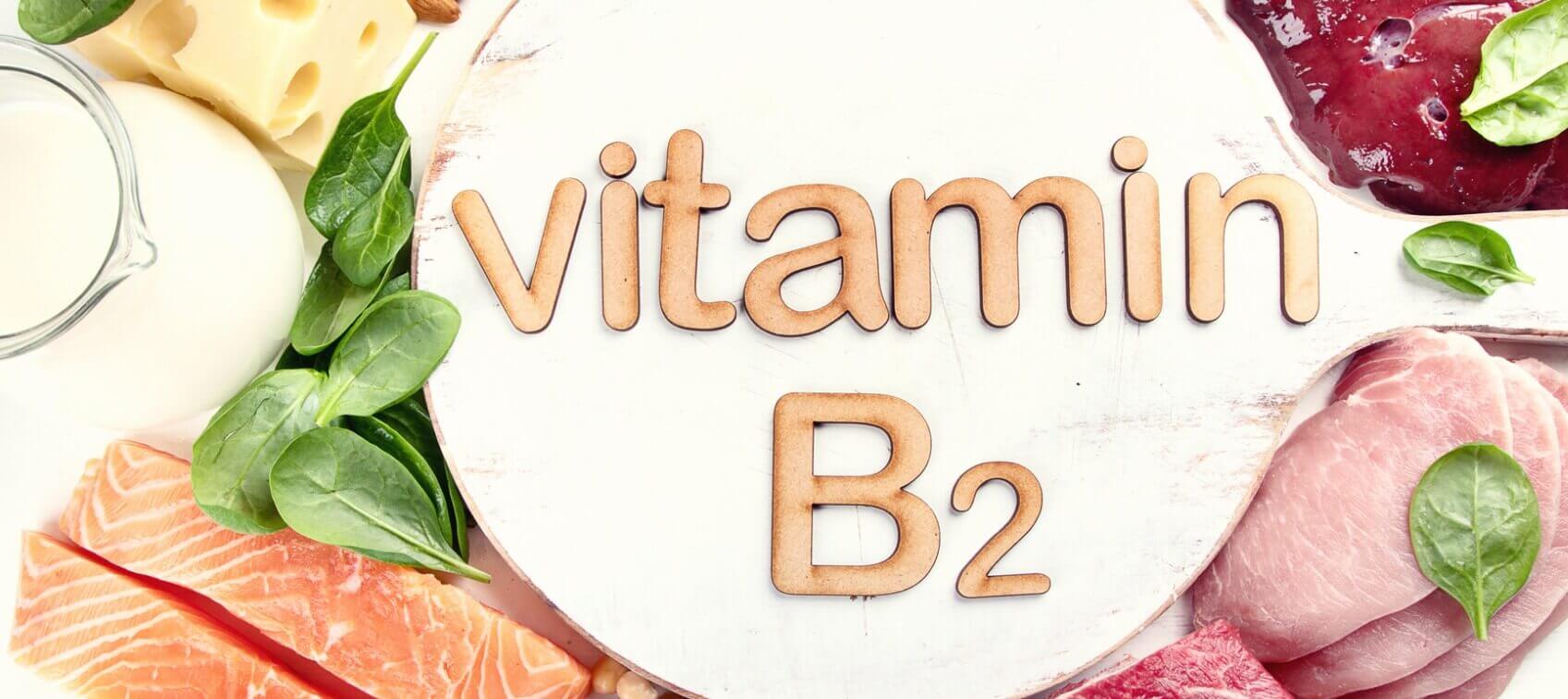
Do your lips get cracked often? Or, do you find yourself getting tired easily?
If yes, chances are you may have riboflavin deficiency.
Riboflavin, vitamin B2, is an essential vitamin that your body needs for various functions. Its deficiency may cause conjunctivitis, sore throat, lesions on the lips, and more.
What is Riboflavin
Riboflavin, or vitamin B2, is among the eight B vitamins that are vital for maintaining your health. It plays a crucial role in absorbing other nutrients, breaking food components, and preserving tissue health.
Riboflavin is a potent antioxidant and may protect your body from the damage of free radicals, which are responsible for age-related disorders.
It is a water-soluble vitamin and moves through your body through the bloodstream. Excess riboflavin passes out of the body through urine.
As your body cannot retain vitamin B2, you need to consume it every day.
Riboflavin is present in certain foods such as spinach, meat, eggs, almonds, and many others.
Its deficiency is rare in the USA since it is present in many regularly used food items.
If you are deficient in this vitamin, try and include riboflavin-rich foods in your diet or take supplements. It is also best to consult a doctor to understand the cause of your deficiency.
Role of Riboflavin in Your Body
Riboflavin is an indispensable part of enzymes that regulate cellular function, energy production, and the metabolism of drugs and fats.
It is also essential for maintaining levels of other B-vitamins and homocysteine, a type of amino acid in your blood.
Riboflavin aids in breaking down carbohydrates, proteins, and fats from the food you consume. It breaks down carbohydrates to adenosine triphosphate (ATP), which produces energy.
Moreover, riboflavin is essential for:
- Maintaining a healthy liver
- Keeping the nerves, skin, eyes, and muscles healthy
- Producing hormones by your adrenal glands
- Supporting fetal development
- Absorbing and activating folic acid, iron, and vitamins B1, B3, and B6
Recommended Dietary Allowance
The recommended daily allowance of riboflavin for men is 1.3 mg a day, and for women, it is 1.1 mg a day. The need increases during pregnancy and lactation, when the doses are 1.4 mg and 1.6 mg a day, respectively.
Causes of Riboflavin Deficiency
As mentioned before, riboflavin is widely present in many food items, so deficiency is rare.
However, the following factors may result in vitamin B2 deficiency:
- Inadequate riboflavin consumption
- Malabsorption disorders that prevent its absorption
- Chronic conditions such as liver diseases and recurrent diarrhea
- Chronic alcoholism
- Dialysis
- Long-term use of barbiturates
Individuals at Risk of Riboflavin Deficiency
There are two types of deficiency:
- Primary deficiency: A diet deficient in vitamin B2
- Secondary deficiency: When your intestines cannot absorb B2, the body cannot use it, or the vitamin is excreted rapidly.
Some groups are prone to riboflavin deficiency, such as:
- Pregnant and lactating females
- Infants and children
- Elderly people over 65 years old
- Athletes
- People with riboflavin transporter deficiency
Consequences of Riboflavin Deficiency
Now that you know a little about the vitamin, let's understand what happens when you are deficient.
Anemia
Riboflavin alters iron absorption, which is an important component of your hemoglobin.
Your hemoglobin is a part of red blood cells that aids in the transportation of oxygen to other cells. A deficiency of hemoglobin results in anemia, causing fatigue and various other symptoms.
Skin and Hair Disorders
Collagen is a protein found in hair and skin. Riboflavin plays an essential role in maintaining an adequate level of collagen.
Collagen deficiency may cause rashes, acne, dry and flaky skin, wrinkles, and cracked lips. Your skin may also become excessively sensitive to sunlight. Riboflavin intake may improve your skin complexion and keep it glowing and radiant.
Low levels of this vitamin may cause hair to lose its luster and trigger hair falling out.
Migraine
Migraines may arise due to imbalances in brain chemicals, though the causes of migraines are still up for debate in the scientific community.
Research does indicate a link between riboflavin deficiency and migraines, and taking riboflavin may help in preventing or managing these types of intense headaches.
Studies where participants took 400 mg of riboflavin a day had fewer headaches than those on placebo.
Eye Disorders
Riboflavin plays an essential role in maintaining eye health, and deficiency may increase the risk of cataracts.
Studies show that people who take enough riboflavin in their diet are at a lower risk of cataracts.
According to research, taking riboflavin can reduce the risk of cataracts, especially in malnourished people.
In addition, riboflavin is crucial for niacin synthesis, which boosts eye health and protects you from cataracts.
Homocysteinemia
Homocysteine, an amino acid in your blood, helps your body to make proteins. Vitamin B2, B6, B12, and folic acid break down homocysteine to form substances that are beneficial for your body.
A higher level of homocysteine is known as homocysteinemia, which may cause dementia, stroke, and heart attacks.
Riboflavin supplements can reduce homocysteine levels by 40%.
A study in the journal Circulation proposes that a 25% reduction in homocysteine levels may lower the risk of stroke by 19% - 24% and coronary artery disease by 11% - 16%.
A reduction in homocysteine may also lower the risk of Parkinson's disease, epilepsy, Alzheimer's disease, and dementia.
Additionally, when riboflavin is given with anticonvulsants, it enhances seizure control by lowering homocysteine levels.
Preeclampsia
Preeclampsia is a complication of pregnancy causing high blood pressure.
High homocysteine level is one of the causes of preeclampsia. By lowering homocysteine levels, riboflavin may protect pregnant females against this condition.
This vitamin, along with vitamin B12 and folic acid, is usually given to pregnant females to lower the risk of preeclampsia.
Fetal Developmental Abnormalities
Riboflavin carrier protein is fundamental for normal fetal development. Deficiency of riboflavin and other vitamins has been linked to cleft lip-palate. Deficiency may also cause gastrointestinal developmental abnormalities.
Cardiovascular Disease
As mentioned before, riboflavin plays a vital role in maintaining homocysteine levels. Homocysteinemia is a risk factor for cardiovascular diseases such as heart attack.
Riboflavin supplementation is seen to have a protective effect against cardiovascular disorders in animals. However, this benefit is not clear in human studies.
Symptoms of Riboflavin Deficiency
Some common symptoms of riboflavin deficiency include:
- Fatigue and weakness
- Sores or cracks on lips
- Red, scaly patches on the skin
- Hair loss
- Swollen blood vessels in the eye
- Inflammation of the tongue
- Insomnia
- Trembling
- Increased sensitivity to light
Sources of Riboflavin
Food Items
Many food items are rich in riboflavin. Some options that are easy to incorporate to help prevent riboflavin deficiency are:
- Yogurt
- Eggs
- Organ meats
- Salmon and tuna
- Almonds
- Milk
- Cheese
- Pork and lean beef
- Chicken breast
- Fortified bread and cereal
- Spinach
- Soybeans
- Grains such as wheat
- Asparagus
- Cheddar cheese
Add these foods to boost your riboflavin levels.
Riboflavin Supplements
People who cannot get adequate riboflavin from food can choose to try a riboflavin supplement. But, as with other supplements, consult your doctor before starting to take it.
A riboflavin supplement is mainly helpful to manage and prevent riboflavin deficiency.
The ideal dose is between 25-100 mg. Your intestines can absorb only a small amount of riboflavin, and the rest is excreted out of the body.
Side Effects of Riboflavin Supplementation
Riboflavin supplements are usually safe for consumption. However, it may cause some undesirable effects in many people, especially when taken in a higher dose:
- Diarrhea
- Itching
- Numbness
- Stomach cramps
- Blurriness
- Light sensitivity
- Burning sensation of the skin
Riboflavin supplements are available as capsules, liquids, tablets, and injections. Many prescription eye drops and injectable eye formulations are also available.
Conclusion
Riboflavin, or vitamin B2, is extremely important for health and various body functions. It also aids in the absorption of other nutrients.
Thus, low levels of riboflavin are associated with a deficiency of other vitamins and nutrients. Some common hazards of riboflavin deficiency include skin disorders, cataracts, anemia, cardiovascular diseases, hair loss, and migraine.
Fortunately, riboflavin deficiency is rare, as riboflavin is widely present in food sources. It is also available as a supplement!


